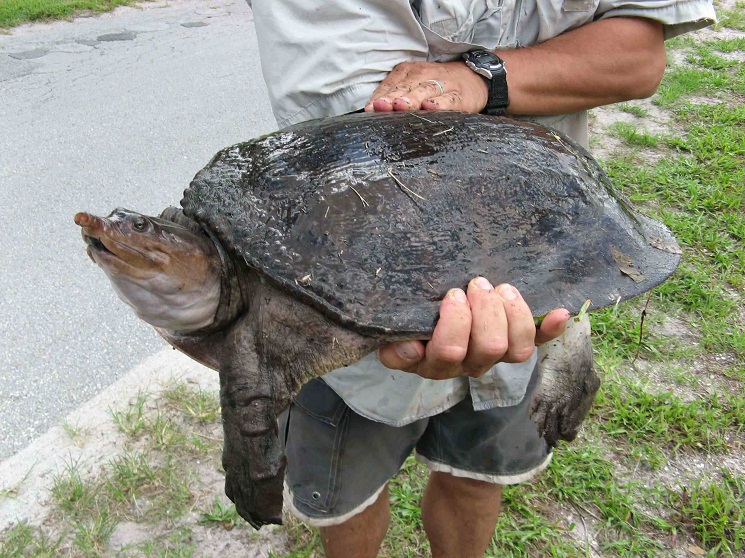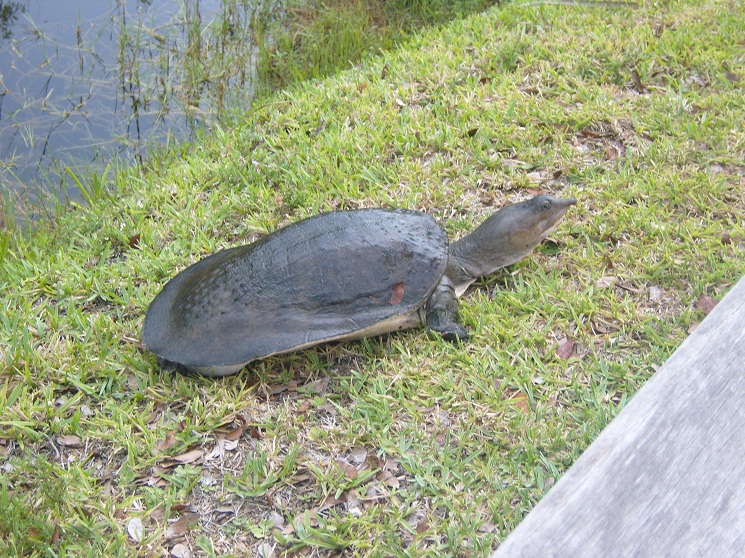Florida softshell turtles can be dangerous due to their aggressive nature and powerful bites. These turtles are known to bite when they feel threatened, so caution should be exercised when encountering them.
Florida softshell turtles are fascinating creatures found in the southeastern United States, known for their distinct soft shells and elongated bodies. As with any wildlife, it is essential to understand the potential risks associated with these creatures. While Florida softshell turtles may not pose a threat to humans in normal circumstances, they can become dangerous if mishandled or provoked.
Their aggressive behavior, coupled with their powerful bites, makes it crucial to exercise caution when encountering them. We will explore the nature of Florida softshell turtles and shed light on any potential dangers they may present. Whether you are a nature enthusiast or simply curious about these unique reptiles, it is essential to be informed for your own safety and the well-being of these remarkable creatures.
Introduction To Florida Softshell Turtles
Florida Softshell Turtles, scientifically known as Apalone ferox, are reptiles that can be found in the southeastern parts of the United States. These turtles are known for their distinct softshell, which sets them apart from other turtle species. The shell of Florida Softshell Turtles is covered with cartilage, giving it a leathery texture and flexibility.
Habitat and Distribution:
Florida Softshell Turtles are primarily aquatic creatures that inhabit various freshwater habitats such as rivers, lakes, swamps, and even brackish water bodies. They are especially common in Florida due to the ideal warm climate and plentiful water sources.
This species has a wide distribution range, extending beyond Florida, and can be found in neighboring states like Georgia, Alabama, and South Carolina. They often prefer areas with soft, muddy bottoms where they can bury themselves and wait for prey.

Credit: www.animalspot.net
Characteristics And Behavior
Florida Softshell Turtles are known for their unique physical characteristics. They have flat, pancake-shaped shells which allow them to swiftly maneuver in the water. The shells are covered with soft, leathery skin, unlike other turtles with hard shells. This adaptation enables them to quickly hide under the sand or mud, camouflaging themselves from potential threats. The shell color varies depending on the individual, ranging from olive or olive-brown to blackish-gray, aiding in their blending into their surroundings.
These turtles are primarily aquatic and are usually found in freshwater bodies such as lakes, rivers, and swamps. They are excellent swimmers and spend most of their time submerged in the water. Florida Softshell Turtles are carnivorous and opportunistic feeders. They prey on small fish, amphibians, and aquatic invertebrates. It is important to note that they are not aggressive towards humans unless they feel threatened or cornered.
Florida Softshell Turtles, like other wildlife, usually prefer to avoid human interactions. However, if approached or captured, they may show defensive behavior by biting or scratching. It is crucial to treat these turtles with respect and maintain a safe distance to ensure the safety of both humans and the turtles themselves. If you encounter a Florida Softshell Turtle, admire it from afar and resist the temptation to handle or disturb it.
Are Florida Softshell Turtles Dangerous?
Are Florida Softshell Turtles Dangerous?
Florida Softshell Turtles, while generally harmless creatures, can potentially pose some risks and concerns in certain situations. One of the main concerns is their bite, as they have strong jaws and sharp beaks that they may use defensively if they feel threatened. It’s important to remember that softshell turtles are generally shy and prefer to stay hidden or submerged in bodies of water.
Another risk is the potential transmission of diseases or infections if you come into contact with their saliva or bodily fluids. While the chances of this happening are quite low, it is still recommended to handle softshell turtles with caution, especially if you have any open wounds or cuts on your hands or arms.
- Avoid handling or approaching softshell turtles in the wild, unless you are a trained professional.
- If you encounter a softshell turtle, give it plenty of space and observe from a safe distance.
- Never attempt to feed or provoke a softshell turtle, as this may lead to aggressive behavior.
It is important to protect and preserve the habitats of Florida Softshell Turtles for their own survival and the health of aquatic ecosystems. Support local conservation organizations and initiatives that focus on preserving wetlands and rivers, as these areas are essential for the survival of softshell turtles and their diverse range of wildlife companions.

Credit: www.youtube.com

Credit: www.animalspot.net
Conclusion
While Florida softshell turtles may have a reputation for being aggressive, they are generally not dangerous to humans if left undisturbed. However, caution should always be exercised when encountering any wild animal. It is important to respect their natural habitat and avoid any unnecessary interactions to ensure everyone’s safety.
Overall, understanding and respecting these fascinating creatures can lead to peaceful coexistence.





Leave a Reply